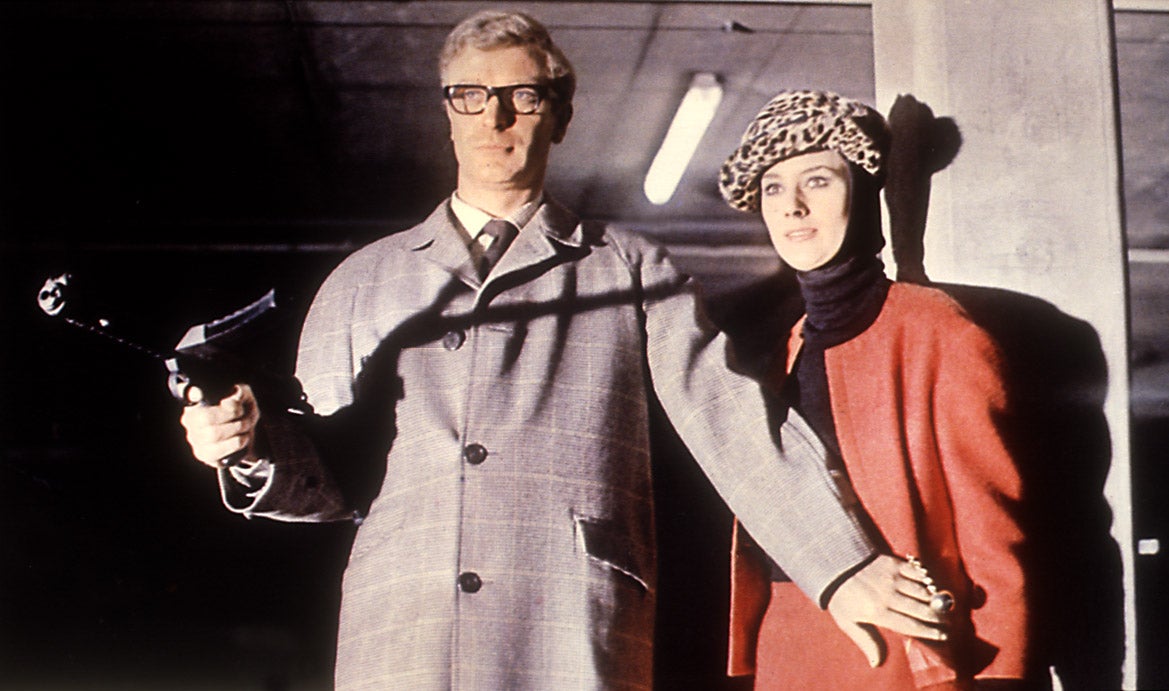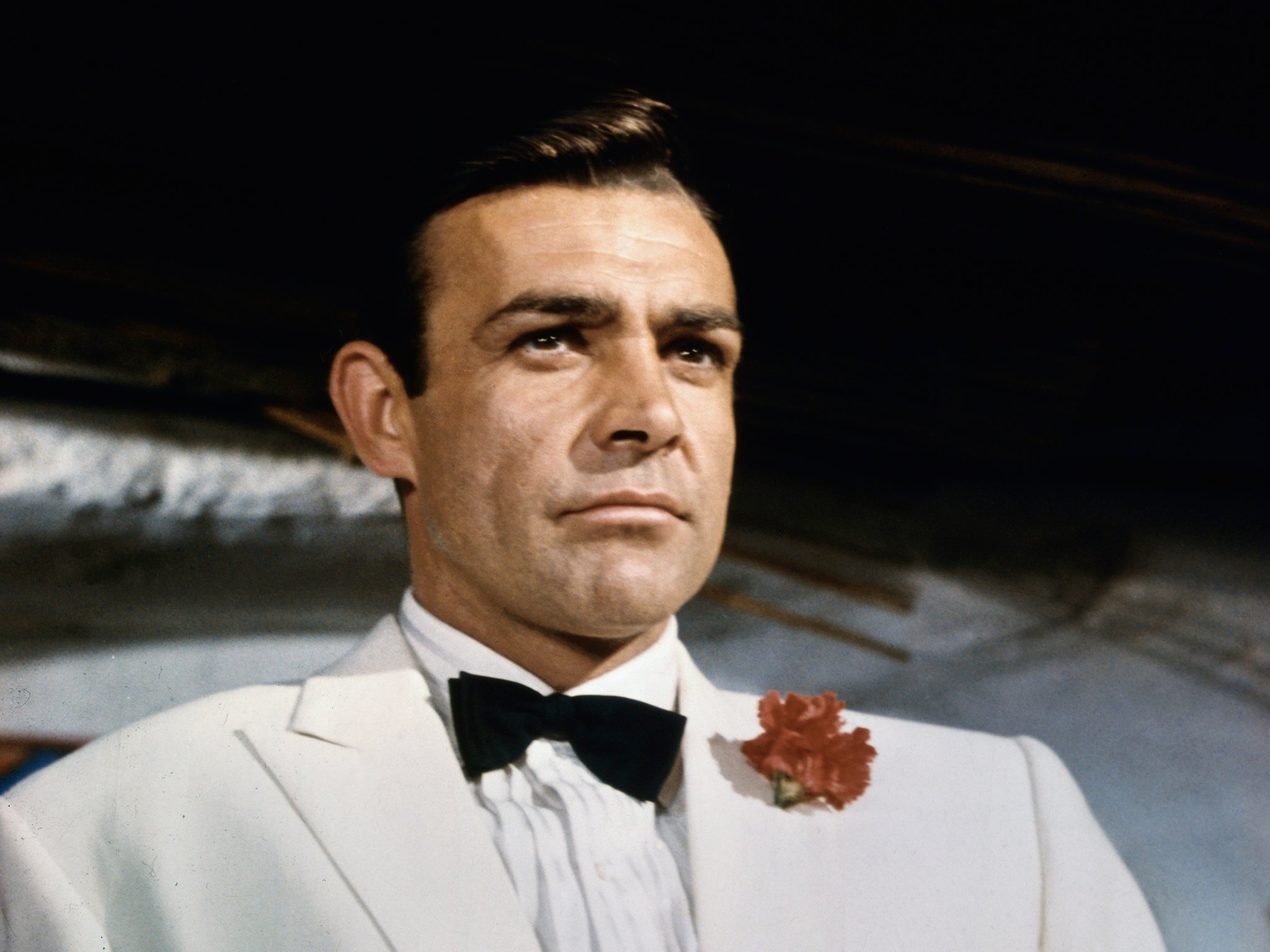‘Insubordinate, insolent, a trickster’: Is secret agent Harry Palmer a viable alternative to Bond?
As ITV revives ‘The Ipcress File’ with Joe Cole as Harry Palmer, Geoffrey Macnab looks back at the original films and asks whether the spy could still serve as a useful counterweight to 007

Liverpool city centre underwent a strange transformation last month. All of a sudden, vintage cars and people dressed in their Carnaby Street best thronged the streets, turning it into a little corner of Sixties London as filmmakers shot their new version of an espionage classic, The Ipcress File. Joe Cole, the young star of Peaky Blinders and Gangs of London, was seen wearing a mac and thickset glasses. He is taking over the role of Harry Palmer, the renegade secret agent played so memorably by Michael Caine in the 1965 adaptation of Len Deighton’s novel.
London itself has changed dramatically since the film was shot. That is why the new TV drama is being made in Liverpool. It is directed by James Watkins (best known for McMafia and The Woman in Black) and scripted by John Hodge (who wrote the Trainspotting screenplay).
Harry Palmer’s comeback, which co-stars Tom Hollander and Lucy Boynton, is being pitched as the perfect pick-me-up for fans exasperated by the long wait for a new James Bond adventure, and the producers are promising that it will have the same dark, cerebral quality found in John le Carré’s Tinker Tailor Soldier Spy and Smiley’s People.
The TV series is the culmination of a 10-year battle by Altitude Film and Television boss Will Clarke to get Harry Palmer back on screen. Since 2010, he has painstakingly acquired the rights to all the adventures featuring the spy. Keeping it in the family, Hilary and Steven Saltzman – children of Harry Saltzman, the Bond producer who first brought The Ipcress File to the screen – are on board as executive producers. “This is the first of many,” Clarke tells The Independent. “It will be a returnable series.”
Harry Palmer wasn’t actually named in Deighton’s novel, which was written in the first person without the narrator disclosing his identity. The “Harry” came from Caine, who suggested it was “a pretty dull name”, and the surname was suggested by Saltzman, who said “the dullest person I ever met was called Palmer”. The identity, though, has stuck and Clarke is now looking to build a new film and TV franchise around it.
Clarke had thought at first about updating The Ipcress File to the present day but he quickly realised that Harry Palmer belonged to the 1960s. This was the period in British social history when rigid attitudes toward class, sexuality and civil rights were starting to loosen; when that old forelock-tugging deference to the establishment was abandoned and when a younger generation began to express itself in art, music and fashion. The novel, which will be reissued as a Penguin Modern Classic later this month, was published in 1962, the year of the Cuban missile crisis and of music producer George Martin’s first recording sessions with The Beatles. The film version came out three years later.
“Len [Deighton] captured that social mobility and how Britain was changing at a particular point in time,” Clarke reflects. “Harry is a working-class man in a world where class structure is very strict. He uses humour as a defence mechanism. He is probably better than his contemporaries … He is not tied down to a particular view of the world in terms of class.”
Saltzman’s original reasons for making The Ipcress File remain ambiguous. Bizarrely, it seemed as if he was betting against James Bond, the character he and fellow producer Cubby Broccoli were then busy turning into the biggest movie phenomenon of the era. They had just made Goldfinger, the third in the 007 series, when he turned his eye to Harry Palmer.
“Why compete with ourselves?” Broccoli asked in chagrin, understandably questioning his partner’s commitment to the Bond series. Saltzman, though, according to film critic and historian Alexander Walker, “wanted a hedge against the innumerable imitations which the James Bond films were now spawning worldwide and which, he feared, might make the public weary of the original”.

Whereas Bond was a fantasy figure, audiences could easily identify with Harry Palmer. “Even the name has a plebeian ring,” reviewers wrote admiringly, saluting his “fish and chips and HP sauce” ordinariness.
Much of the fascination of the original film version lies in its collision of styles. On the one hand, it’s a tough, realist Cold War tale featuring characters who all had their formative experiences during the Second World War. Its male protagonists have severely cropped hairstyles and some, notably Harry Palmer’s boss, Major Dalby (Nigel Green), sport the type of moustaches that used to be worn by dashing RAF pilots in movies about the Battle of Britain. Nonetheless, there are signs that the film’s younger protagonists, most notably Harry himself, are throwing off the shackles that society has placed on them.
“Insubordinate, insolent, a trickster, perhaps with criminal tendencies,” is how Harry’s character is summed up early on by his espionage bosses. That is why they hire him. As one repeats toward the end of the film, “I was counting on you being an insubordinate bastard.”
The “insubordinate” description is another way of saying that Harry didn’t go to public school. He is a working-class figure, “a spy-hero who speaks with a Cockney accent and listens to Bach”, as one incredulous reviewer put it. Someone from Harry Palmer’s background wasn’t expected to enjoy fine food and classical music, or to disobey orders and think for himself. He followed in the tradition of the angry young men in John Osborne plays or John Braine and Alan Sillitoe novels, but Harry was far more of an aesthete than the beer-glugging Albert Finney in Saturday Night and Sunday Morning and far cannier and more cunning than the resentful, raging Richard Burton in Look Back in Anger.

There are obvious contradictions about The Ipcress File. It may have been intended as an anti-Bond movie, yet many of its crew, including its composer John Barry (who wrote one of his finest scores), its brilliant production designer Ken Adam and its editor Peter Hunt, were key members of the Bond team. It is questionable, too, whether the film is quite the exercise in dirty realism that the publicity claimed. It has its share of gadgets, most notably a machine that brainwashes victims into forgetting important scientific secrets or even their own names. And just as in Bond movies, there are fights and chases. The female characters, notably Palmer’s girlfriend Jean Courtney (Sue Lloyd), are treated in just as cursory and dismissive a fashion as the women in the 007 screen adaptations.
Caine, meanwhile, was being groomed as a star by Saltzman, who had put him under contract. He may have been the son of a Billingsgate fish market porter, but he had obvious charisma and good looks and was seen as British cinema’s newest “heart-throb”.
Throughout shooting, a war of attrition was waged between Saltzman and Sidney J Furie, the young Canadian director he had hired. Furie had just made The Leather Boys, a gritty, youth-based drama notable for featuring bikers, teenage marriage and a gay character. Furie was a maverick who didn’t like the original screenplay and was determined to shoot the film in a fluid, freewheeling fashion. For all his rhetoric about getting away from Bond, Saltzman was deeply suspicious of such an approach. He wanted at least a smattering of glamour. The producer was wary, too, about Harry Palmer seeming too effeminate.
Betraying the homophobia of the period, Caine writes in his autobiography of how Saltzman and Furie tried to “de-gay” his role. Harry may have been shown cooking a perfect omelette, grinding coffee beans and pushing a shopping trolley in the supermarket – not something James Bond ever did – but he performed these activities in a “macho” way.

The brilliance of The Ipcress File lies less in its murky storytelling than in its star performance, its atmosphere, its music and its look. Cinematographer Otto Heller shot the film in a style very similar to the one he used in Michael Powell’s supremely creepy serial killer film, Peeping Tom (1960). The Ipcress File too is an exercise in clammy voyeurism. The audience is continually put in the position of a spy, peering furtively at Harry through a pair of cymbals, a dirty glass pane, a red telephone box or a lampshade as he holds his secret meetings.
Any pretence at realism was abandoned in the Harry Palmer sequels made later in the Sixties: Funeral in Berlin (1966), directed by Guy Hamilton, and Billion Dollar Brain (1967), directed by Ken Russell. The Ipcress File had been so successful that Saltzman was able to ramp up the budgets for the follow-ups and to shoot in more exotic locations. The argument that Palmer was an “anti-Bond” could no longer be sustained. The two spies may have spoken and dressed differently, but they came to inhabit very similar universes.
It will be intriguing to see how the new Harry Palmer evolves. Clarke talks of Cole as an actor in a very similar vein to the young Caine.
“Joe is inhabiting the role in his own way … He comes from a working-class background,” says Clarke. “Although society has moved on, he can put himself in the shoes of Harry Palmer at that particular point in time. He is also nailing that sardonic humour which is a signature of Harry.”
As long as the first series works, Cole is likely to be playing Palmer for some time to come. No one expects him to eclipse memories of Caine, but he will attract a new, younger audience who may not be aware of the original movies.
Will Harry Palmer still be able to make a decent omelette? That’s one question that will only be answered when the series is broadcast next year.
‘The Ipcress File’ film is available on Amazon Prime
Len Deighton’s books, including ‘The Ipcress File’, are being reissued by Penguin Modern Classics at the end of April
Join our commenting forum
Join thought-provoking conversations, follow other Independent readers and see their replies
Comments